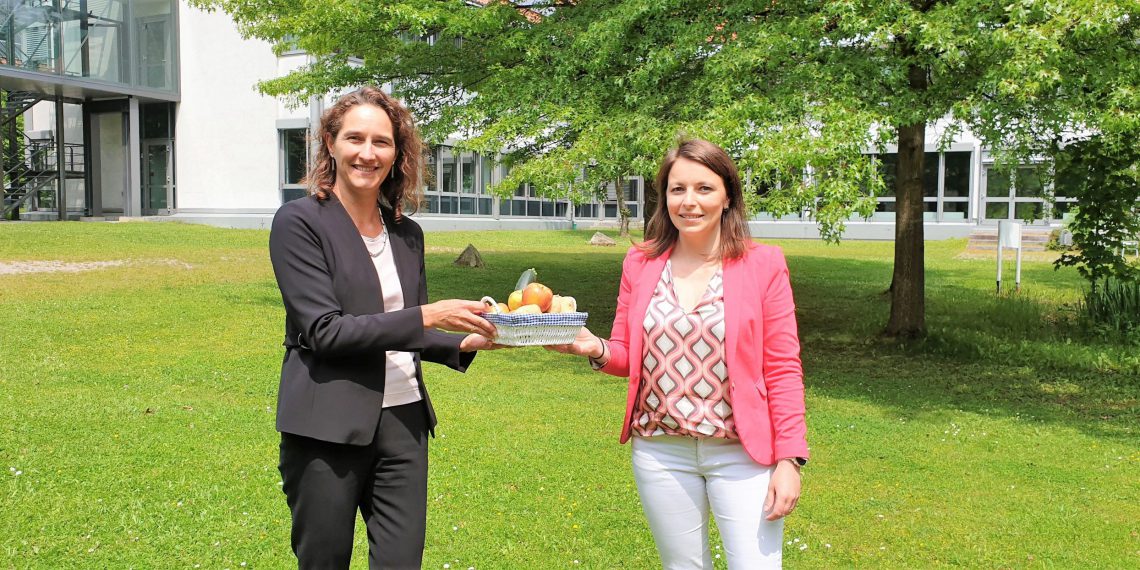In the future, it should be possible to monitor and assure the quality of (organic) food along the value chain more quickly and efficiently than before. To this end, new sensory detection methods are being developed that will help to reduce food losses. From harvesting to logistics and storage to processing or the way to retail, methods are to be provided with which food can be planned, distributed and further processed in the best possible way, taking into account individual quality characteristics. They are being developed in the joint project “SHIELD — Safe domestic (organic) food through sensory detection methods”, which is being funded by the Bavarian Research Foundation with €1.2 million. Coordinated by the Fraunhofer Institute for Process Engineering and Packaging IVV, this digital transformation of analytics, sensor technology and detection in food quality management will start on July 1, 2021.
Together with scientific institutions and application partners, fundamental concepts are being developed that also involve monitoring and control authorities such as the Bavarian State Office for Health and Food Safety. The proportion of organically farmed land in Bavaria has been rising steadily since 1994 and is to be increased to 30% of agricultural land by 2030 through the BioRegio 2030 program. At the EU level, moreover, the area to be farmed organically will be expanded to 25% from 2023 under the new Common Agricultural Policy (CAP) and the Farm-to-Fork strategy. “Strengthening quality and safety across organic value chains is therefore also of great importance for the competition of the Bavarian organic sector. In order to reduce the need to sort out food raw materials that are damaged or unsuitable for human consumption, we need simple and reliably manageable processes that can be used to analyze raw materials as soon as they are received,” explains Prof. Dr. Andrea Büttner, Executive Director of the Fraunhofer IVV and joint spokesperson for the SHIELD project.
Handheld devices and smart software facilitate planning
Sensory detection methods should make it easier to generate quality forecasts and optimize logistics chains in order to address the actual needs of the food industry and consumers. By accurately determining the (organic) raw material quality for processing or delivery to retail, food losses can be significantly reduced.
“Among other things, we are combining sensor technologies, optical methods and smart algorithms to develop handheld devices and smart software that can be used in small-scale operations. In addition, detection methods for the authenticity of both raw materials and produced foods are being established.”
- Dr. Susann Vierbauch of the Fraunhofer IVV
At the Chair of Aroma and Odor Research at the Friedrich Alexander University of Erlangen-Nuremberg (FAU), marker substances are defined from authentic sample material for quality determination. These form the basis for the development of rapid methods for incoming goods. The Fraunhofer IVV, the Fraunhofer Research Institution for Microsystems and Solid State Technologies EMFT and the Chair of Analytical Food Chemistry at the Technical University of Munich are responsible for the evaluation. Profiling methods are being developed at the Chair of Food Chemistry at FAU in order to be able to systematically detect unexpected problems.
In addition to recording the quality and safety of the delivered raw materials, the rapid and profiling methods are also used to determine the authenticity of the raw materials. During the project, the rapid methods will be continuously compared with further findings and validated in practice at the industrial partners. These findings are incorporated into a data platform that is used for combinatorial analysis and correlation of the measurement results.
Digital incoming goods and online logistics
The evaluated low-cost sensors, which are used on site by the industry partners during goods receipt as a quick method as well as during storage, provide valuable data on the quality, safety and authenticity of the raw goods. Thus, the digitization of incoming goods via NIR and optical methods generates an enormous amount of information, e.g., about shape, color, size and texture. This information enables reliable shelf life predictions through pattern recognition and thus improves logistics and formulation during processing. At the Chair of Machine Learning and Data Analytics at FAU, methods and models for shelf life and sales forecasts are being developed for this purpose.
This takes into account the fact that product-specific knowledge can be integrated into the forecasts. In this way, seasonal fluctuations in sales can be taken into account. Based on this, mathematical optimization models are provided at the Chair of Business Mathematics to support the formulation process. These automatically generate suggestions for forward-looking, sustainable production planning. An online approach ensures that logistics and production are always in an optimal state through constant reoptimization when new information arrives.
As part of the project, a needs analysis is being carried out and knowledge transfer established at the Technical University of Nuremberg at the Neumarkt i.d.Opf. site in the research area of management in the organic sector. The aim is, in addition to recording the overall situation in the organic sector, to define the specific challenges and implement the findings from the SHIELD project. In addition, these are then to be transferred to other related product levels.

















